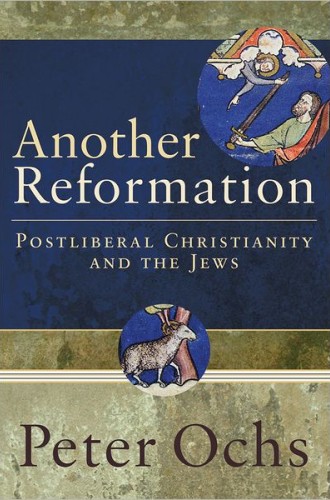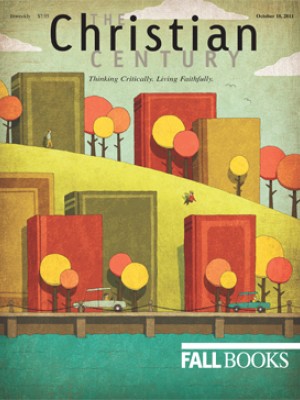Another Reformation, by Peter Ochs
The interface of Jewish and Christian theology has always been vexing. Partly this is because of the intrinsically incommensurate realities of the two faiths. And partly it has been because of Christian interpreters' uncritical practice of supersessionism, which has been combined with political power that is used in controlling and abusive ways. Happily, we are at the threshold of a new way of communicating at that interface.
Many interpreters have contributed to this emerging possibility. In Old Testament studies, the most important summoning work has been Jon Levenson's 1987 article "Why Jews Are Not Interested in Biblical Theology," which made unmistakably clear the supersessionist assumptions of even the most sophisticated interpreters.
Read our latest issue or browse back issues.
More broadly, no one has contributed more to this fresh possibility than Peter Ochs. With his largeness of spirit, his deep theological sensibility and his practical passion for fresh work with Christians, he has taken on important initiatives that have made room for new communication and understanding. His initiatives honor the distinctions and differences between the two traditions, and through face-to-face engagement with texts, which he calls Scriptural Reasoning, he has encouraged participants to move beyond stereotypes to deal with what matters most about differences and about commonalities. He has judged, surely correctly, that Judaism and Christianity are proper conversation partners, and that neither tradition can faithfully take Enlightenment rationality as its mode of witness or as its proper conversation partner.
In Another Reformation Ochs presents a survey of newer Christian interpreters whom he categorizes as postliberal. They move in new directions, start with different assumptions and have different intentions in mind.
It is not easy to define what postliberal means. The liberalism to which it is post is the popular, uncritical assumption that theological claims must be submitted to modern Enlightenment reason, a preference that continues to be powerful among self-styled progressives. That mode of rationality has been the defining epistemological commitment of historical-critical scripture study, a point well made by Levenson.
Ochs shows that such liberal theology is given to dyadic or binary reasoning, so that exclusive contrasts are the order of the day—surely among them the contrast between Judaism and Christianity, with an unstated footnote to Marcion. The postliberals have moved beyond that binary way of discerning the claims of faith. Ochs shows that antiliberals, by which he means conservatives who interpret scripture as a set of propositions (as George Lindbeck observes), have played the same binary game, and he exposes the way in which both liberals and antiliberals are pressed by such binary thinking to supersessionism—because they set the claims of the Christian gospel logically and exclusively over against the claims of Judaism.
The substance of Ochs's book is his review, in two clusters, of the most important interpreters who do postliberal work. On the U.S. scene the lead characters are Lindbeck, with his defining book The Nature of Doctrine; Stanley Hauerwas, with his widely published and widely articulated rejection of modernism; and Robert Jenson, whose "reparative work" on the disunity of the church is given detailed consideration here. These three theologians have moved in new directions that amount to nothing less than a reformation of the categories through which faith is presented and understood. To these Ochs adds John Howard Yoder, for whom he has great appreciation but whom he finally judges not to be postliberal. The reason is that Yoder continues to engage in binary thinking, particularly with his assertion that exilic Judaism is the real thing, in contrast to Messianic Judaism. One can see the decisiveness of this issue for Ochs, for such a judgment breaks the triad of "torah, land and people" and refuses "the dialectical relation between exile and landedness" that is representative of "classical Jewish life and belief."
His second cluster of scholars consists of the two English Anglican theologians Daniel Hardy and David Ford, for whom postliberalism is much more consciously ecclesial but moves in the same direction beyond binary thinking. To these Ochs adds John Milbank, except that Milbank has a yen for the universal and thus is not a postliberal in Ochs's view.
The upshot of Ochs's careful, erudite, detailed argument is that postliberal theology escapes the traps of both liberal and antiliberal reason and so is not drawn to supersessionism. Indeed, postliberal theology is perforce nonsupersessionist, and because of this move beyond binary reasoning and an ache for the universal, "in the company of these partnerships, Jews need not consider themselves alone." That happy judgment, shot through with pathos, measures the way in which supersessionism has excluded Jews from the table of faith and the companionship that properly belongs to biblical possibility.
Postliberal theology, Ochs makes clear, is an immensely important force in contemporary thought. It is characterized by a vagueness that does not need to sort things out into contradictions and contrasts that exclude and by a satisfaction with the particular that can be trusted. Postliberals have no need to make clear, universal claims for truth that are inevitably triumphalist and exclusionary. With this accent on the particular, it follows that another particular, Judaism for Christians and Christianity for Jews, can be honored and taken seriously, as Ochs himself does in this venturesome work.
Beyond its main thesis, this book is an invitation to engage further the demanding work of the theologians cited here. A companion book might now be written on "postliberal Judaism and the Christians."
Now that postliberal Christian theology has found a way beyond Christian triumphalism and the exclusionary claims of Christ, I wonder how this perspective might relate to a postliberal Jewish understanding of the Torah or of the land (to which Ochs gestures by referring to the dialectic of exilic and Messianic Judaism). I cite Torah and land as the two apparent nonnegotiables of Judaism in a manner not unlike the way Christ is the Christian nonnegotiable. I wonder whether a postliberal Jewish sense of Torah might move in the direction of Paul's complex argument about Jews and gentiles before the Torah. Such a study is worth waiting for.
In any case, Ochs has performed a formidable interpretive task that awaits follow-up in local settings. The post of postliberal is the awareness that faith need be neither "relativist nor triumphalist" but can trust the divine Word, who "convinces, guides, and redeems through intimate relation rather than through cognitive affirmation-or-denial." Ochs, in his practice and in his exposition, exhibits a way of relating and thinking and believing that makes wholeness and healing possible. It is no wonder that this postliberal enterprise constitutes "another reformation" that will, as in that time past, give a transformative shock to the fashions of certitude and control that continue to prevail among us.






